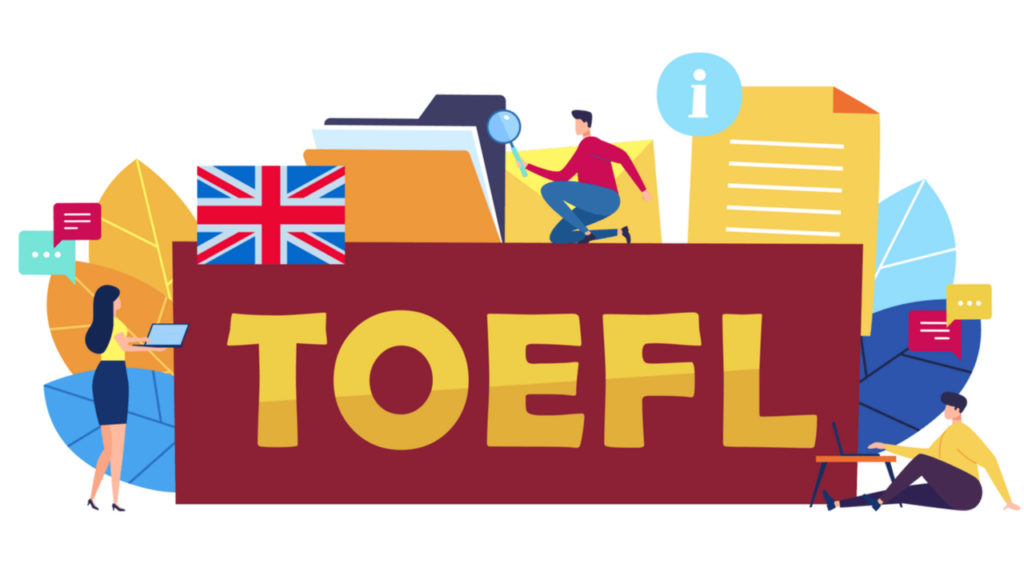If you’re thinking of studying in countries like the USA or Canada, where English matters a lot, the TOEFL exam is a big deal. ETS manages the TOEFL (Test of English as a Foreign Language) syllabus to check how well you read, write, listen, and speak English in a university-like setting. It covers writing, reading, listening, and speaking – all important parts of the TOEFL exam syllabus.
There are two primary types of TOEFL exams, i.e. TOEFL- PBT and TOEFL- iBT, along with other TOEFL tests such as TOEFL Junior and IPT.
In this blog, we’ll talk about what is on the TOEFL exam syllabus for 2023.
Latest Update for TOEFL Exam Syllabus
ETS, the conducting body of the TOEFL test, has shortened the TOEFL iBT exam pattern to just under 2 hours.
Choose your dream country
When do you want to study abroad?
What's your highest level of education?
Select you current city
How Leap will help you
Personalised University Shortlist
Express Applications with Quicker Admits
End-to-End Application Support
There has also been some change in the TOEFL iBT format. Here is a comparison between the new TOEFLiBT exam pattern and the old TOEFL iBT exam pattern:
| Sections | TOEFL Exam Syllabus (Old) | TOEFL Exam Syllabus (New) |
| Reading | Duration: 54 – 72 minutes Questions: 30-40 | Duration: 35 minutes Questions: 20 |
| Listening | Duration: 41-57 minutes Questions: 28 – 39 | Duration: 36 minutes Questions: 28 |
| Speaking | Duration: 17 minutes Questions: 4 tasks | Duration: 16 minutes Questions: 4 tasks |
| Writing | Duration: 50 minutes Questions: 2 tasks | Duration: 29 minutes Questions: 2 tasks |
| Total Duration | 162 – 196 minutes | 116 minutes |
TOEFL Exam Syllabus: Section Wise
As discussed earlier, the TOEFL exam syllabus is divided into four parts: Reading, Listening, Speaking, and Writing.
Out of the four sections, the Listening and Reading sections consist of multiple-choice questions. The total TOEFL score that accounts for both listening and reading ranges from 58-79 marks. The Writing test comprises descriptive questions for which students need to provide long-form and short-form answers. Lastly, the Speaking test requires students to talk about the topics mentioned in the test.
The TOEFL score ranges from 0 to 120, with each section holding a specific score. Any score above 100 is considered a good score.
Please note that the pattern provided is from the TOEFL iBT test.

TOEFL Exam Syllabus: Reading Section
The Reading section of the TOEFL exam syllabus includes two reading passages, each about 700 words long, accompanied by 10 questions per passage. You should expect to spend around 35 minutes completing this section. Your score will be based on the accuracy of your reading comprehension responses.
Question Format:
- 2 passages, 10 questions each
- Total Questions: 20
- Total Time: 35 minutes
TOEFL Exam Syllabus: Listening Section
The Listening section of the TOEFL exam syllabus comprises of 3 lectures, some followed by classroom discussions, each lasting 3–5 minutes and featuring 6 questions per lecture.
Additionally, there are 2 conversations, each around 3 minutes long, with 5 questions per conversation.
You can take notes during the audio segments to assist in answering questions. You should allocate about 36 minutes for completing the Listening section.
Question Format:
a) 3 Lectures (3-5 minutes, approximately 500-800 words), 6 questions each, Total 18 questions
b) 2 Conversations (about 3 minutes, involving 12-25 exchanges), 5 questions each, Total 10 questions
Total Questions: 28
Total Time: 36 minutes
TOEFL Exam Syllabus: Writing Section
The Writing section of the TOEFL exam syllabus includes two essays, each addressing a distinct topic. Responses should be well-structured, supported with relevant explanations, and display unity, progression, and coherence.
Demonstrating varied sentence structures, appropriate vocabulary usage, and minor grammatical errors contributes to achieving a high writing score.
Question Format:
a) 1 Integrated Task – Read/Listen/Write (20 minutes) (reading time: 3 min; listening time: 2 min; writing: 15 min)
b) 1 Writing for an Academic Discussion Task (10 minutes)
Total Questions: 2
Total Time: 30 minutes
TOEFL Exam Syllabus: Speaking Section
In the Speaking section of the TOEFL exam syllabus, achieving high scores requires delivering responses that meet task requirements with minimal errors.
Graders seek clear and sustained conversations. Scoring considers delivery, language usage, and topic development.
Question Format:
a) 1 Independent Task (preparation time: 15 - 30 sec; response time: 45 or 60 sec)
b) 3 Integrated Tasks – Read/Listen/Speak (preparation time: 15 - 30 sec; response time: 45 or 60 sec)
Total Questions: 4
Total Time: 16 minutes

TOEFL Preparation Tips
Preparing for the TOEFL exam syllabus requires a strategic approach to improving your English language skills and knowing the test format.
Here's a step-by-step guide on how to prepare effectively:
- Understand the TOEFL exam syllabus: Get to know the different sections of the TOEFL exam syllabus, including Reading, Listening, Speaking, and Writing. Understand each section's question types, time limits, and scoring criteria.
- Assess Your Skills: Take a practice test or diagnostic test to gauge your current English language proficiency and identify areas that need improvement. This will help you tailor your study plan accordingly.
- Set Goals: Set clear and achievable goals for each section of the exam. Define your target scores and the time you have for preparation.
- Study Regularly: Dedicate consistent time to study each day. Make a study schedule that covers all sections of the exam and allows for thorough practice.
- Improve Reading Skills:
- Read a variety of English texts, such as newspapers, magazines, academic articles, and literature.
- Practice summarizing the main ideas, identifying key details, and understanding the organization of passages.
- Enhance Listening Skills:
- Listen to podcasts, news broadcasts, lectures, and conversations in English.
- Take notes while listening to improve your ability to understand and retain information.
- Develop Speaking Skills:
- Engage in regular English conversations with native speakers or fellow learners.
- Practice speaking on a wide range of topics, giving opinions, and explaining ideas.
- Refine Writing Skills:
- Write essays on various topics and practice expressing ideas clearly and coherently.
- Review and revise your essays for grammar, vocabulary, and structure.
- Use Official TOEFL Materials: Utilize official TOEFL practice materials, including sample questions, practice tests, and study guides. These resources closely reflect the actual exam.
- Take Practice Tests: Regularly take full-length practice tests under timed conditions to simulate the real exam experience. This helps improve your pacing and time management.
- Analyze Your Performance: Review your practice test results to identify your strengths and weaknesses. Focus on areas where you need improvement.
- Seek Feedback: If possible, have your speaking and writing tasks evaluated by a qualified English teacher or tutor. Their feedback can help you identify areas for improvement.
- Vocabulary and Grammar: Strengthen your vocabulary and grammar skills by learning new words and practicing grammar exercises.
- Stay Positive and Motivated: Maintain a positive attitude and stay motivated throughout your preparation. Celebrate your progress and keep your goals in mind.
- Take Care of Yourself: Ensure you're well-rested, eat healthily, and manage stress. A healthy body and mind contribute to effective studying.
Remember that consistent practice and a systematic approach are key to success in the TOEFL exam.
Wrapping up
TOEFL is a language test for the English language and holds great importance for individuals who aspire to work or study in an English-speaking country.
Are you planning to give the TOEFL exam? If you are looking for further guidance for TOEFL, we've got you!
Leap Scholar is proud to have a highly qualified team of counsellors with 50+ years of combined experience in helping students study abroad.
Ready to take the Leap? Book a free counselling session right now!
Frequently Asked Questions
-
Q: Has the TOEFL exam syllabus changed?
A: Yes, the TOEFL syllabus has undergone changes to make the test more efficient. The test duration has been reduced to under two hours from the previous three hours. This was achieved through streamlined instructions and navigation throughout the test. Additionally, a new task called "Writing for an Academic Discussion" has replaced the Independent Writing task. Furthermore, the Reading section has been made shorter to enhance the overall test experience.
-
Q: What is the TOEFL exam syllabus?
A: The TOEFL syllabus encompasses four essential language proficiency areas: writing, reading, listening, and speaking. The reading component involves tackling three to four reading passages, followed by questions related to the passages. The listening segment comprises audio clips featuring 4-6 brief lectures and 2-3 more extended conversations, accompanied by questions to assess comprehension.
-
Q: Is TOEFL harder than IELTS?
A: The difficulty level of TOEFL and IELTS is a subjective matter. However, many students find IELTS to be comparatively easier, particularly in terms of the reading sections. IELTS reading questions often derive from sources like magazines, books, journals, and newspapers. Nevertheless, the difficulty perception varies based on individual strengths and familiarity with the question types.
-
Q: How is 94 TOEFL score?
A: A TOEFL score of 94 falls within the range of an average score. Typically, average TOEFL scores hover around 90, but they can vary from 85 to 95. Scoring above 100 is generally considered a good TOEFL score. It's important to note that there are no inherently "good" or "bad" scores on the TOEFL test; scores should be evaluated in the context of your educational goals.
-
Q: Is TOEFL reading difficult?
A: The difficulty of the TOEFL reading section can vary from person to person. Some individuals may find it relatively easier compared to other standardized tests like the GMAT. However, for non-English speakers, all four sections of the TOEFL test can be challenging. Students who have previously excelled in exams like the GRE might find it easier to perform well in the TOEFL reading and other sections due to their familiarity with similar question formats.
-
Q: Can I take notes during the TOEFL Listening section?
A: Absolutely! You are encouraged to take notes while listening to lectures and conversations in the Listening section. These notes can help you remember key details and organize your thoughts when answering questions.
-
Q: How is the TOEFL exam scored?
A: The TOEFL exam is scored on a scale of 0-120. Each section (Reading, Listening, Speaking, and Writing) is scored separately, and the scores are then combined to give you an overall TOEFL score. Different institutions may have varying score requirements for admission.
-
Q: Are there specific topics covered in the TOEFL exam syllabus?
A: The TOEFL exam covers a wide range of academic topics, including arts, sciences, history, and social sciences. The passages and lectures you encounter may discuss anything from biology to literature, ensuring a diverse assessment of your language skills.
-
Q: How can I best prepare for the TOEFL exam?
A: Effective preparation for the TOEFL exam involves a multi-faceted approach. Engage in regular practice using official TOEFL materials, take practice tests to simulate exam conditions, work on improving your English language skills through reading, listening, speaking, and writing, and focus on your weaker areas. Consider seeking guidance from experienced tutors or online resources to enhance your preparation strategy. Remember that consistent effort and dedication are key to achieving success in the TOEFL exam.
-
Q: Can I use a dictionary during the TOEFL exam?
A: No, you are not allowed to use any external aids, including dictionaries, during the TOEFL exam. The test is designed to assess your ability to comprehend and communicate in English without assistance.
-
Q: How are Speaking tasks divided in TOEFL?
A: The Speaking section of TOEFL consists of four tasks. The first task is independent, where you express your personal thoughts. The next three tasks are integrated, requiring you to combine your reading, listening, and speaking skills to respond to questions.















Have Questions? Get Guidance to reach your Dream University
Connect with India's finest counsellors and biggest study abroad community.
Get Guidance